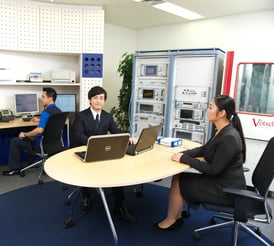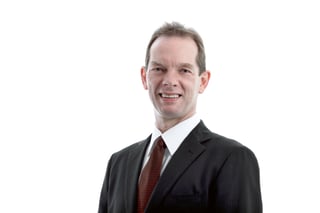Technological Trends
Wireless communications
The increased importance and application of wireless communications are readily apparent in the growing number of new communications protocols being introduced. Wireless technologies have been developed dramatically in these last 15 years. Now we have various protocols such as Wi-Fi, ZigBee,
Wi-SUN and others.What is significant is how these wireless technologies are permeating not only the usual IT products, but across multiple industries.
 |
Bluetooth Laboratory
|
Internet of Things
Expansion into the automotive, medical and industrial sectors was made possible through the development of the “Internet of Things” (IoT). IoT is the network of things — not only information and communication equipment such as computers, but also all physical objects in the world connect to the Internet. By connecting and intercommunicating, objects are to be sensed and controlled remotely.
In the IoT landscape, physical location is no longer a limiting factor to participation. We expect products currently not connected to the Internet to become part of the IoT at an increasing pace. Devices that can be worn by users are becoming popular.
The German high-tech initiative, ‘Industry 4.0’, which in effect defines the fourth industrial revolution, provides further impetus. In such a world, everyone has access to the entire value chain.
The scope is global. A new International Data Corporation (IDC) Spending Guide predicts worldwide spending on the IoT will grow at a 17.0% compound annual growth rate (CAGR), from $698.6 billion in 2015 to nearly $1.3 trillion in 2019.
The Asia Pacific region in 2015 generated more than 40% of the worldwide spending total1. Korea, Singapore, Australia and Japan will be the leaders to adopt IoT in the Asia Pacific (Source: AT Kearney).
The world we live in – Importance of cyber security
Yet, product safety fulfilling cross-border global standards remains paramount. Greater interconnectivity and interdependence of complex ICT systems still aim for reassurances, regardless of where you connect in this IoT, wireless communications world. Cyber security will become even more critical in both industrial and private applications, due to the development of the IoT. Regulation and technical standards in the automotive sector (e.g., R46, R131, and ISO 26262) are in the process of being updated.
The Food and Drug Administration is regulating medical software in the US. As these technologies are applied to products, our verification processes will continue to grow in importance.
The Challenges Manufacturers Face
Increased competition
In an IoT world, competition will increase. Technology will need to continue to evolve, providing lower costs and more robust data analytics.
We have to think global. Products will not sell themselves, so market access will become even more critical for manufacturers to grow their business.
New Supply Chain Bases
The ASEAN Economic Community (AEC) represents more than 622 million people. This huge market will offer us significant opportunities.
Global vision, local precision
We must adjust to the expanding opportunities in this region. TÜV Rheinland provides testing and certification services according to various wireless standards as an accredited, appointed third party.
We adapt our services to the makeup and needs of each country so our clients can stay competitive.
We have offices in 10 countries in Asia Pacific. Take advantage of our expertise as an independent testing organization for your marketing activities. TÜV Rheinland, with IT service provider OpenSky - a part of TÜV Rheinland Group from 2013, will support you in cyber security, too.
Business in the Asia-Pacific Region
The IoT and wireless communications are here to stay. Our commitment to Asia Pacific is country specific and will continue to empower each client to grow their business in the region.
 |
Mr. Frank Piller, MBAVice President Products Frank Piller started his career in 1990 with TÜV Rheinland in Japan. |
Find out more about the latest trending topics in the industry our quarterly customer newsletter tuv.communication:



